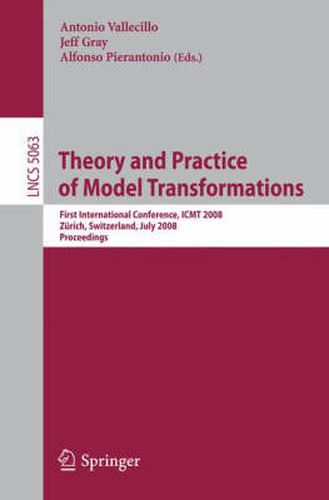Theory and Practice of Model Transformations: First International Conference, ICMT 2008, ETH Zurich, Switzerland, July 1-2, 2008, Proceedings

Theory and Practice of Model Transformations: First International Conference, ICMT 2008, ETH Zurich, Switzerland, July 1-2, 2008, Proceedings
This title is printed to order. This book may have been self-published. If so, we cannot guarantee the quality of the content. In the main most books will have gone through the editing process however some may not. We therefore suggest that you be aware of this before ordering this book. If in doubt check either the author or publisher’s details as we are unable to accept any returns unless they are faulty. Please contact us if you have any questions.
Models have become essential for dealing with the numerous aspects involved in developing and maintaining complex IT systems. Models allow capturing of the relevant aspects of a system from a given perspective, and at a precise level of abstraction. In addition to models, the transformations between them are other key elements in model-driven engineering. Model transformations allow the de?nition and implementation of the operations on models, and also provide achainthatenablestheautomateddevelopmentofasystemfromitscorrespo- ing models. Furthermore, model transformations may be realized using models, and are, therefore, an integral part of any model-driven approach. There are already several proposals for model transformation speci?cation, implementation and execution, which are beginning to be used by modeling practitioners. However, model transformations need specialized support in s- eral aspects in order to realize their full potential. The problem goes beyond having speci?c languages to represent model transformations; we also need to understandtheirfoundations,suchasthekeyconceptsandoperatorssupporting those languages, their semantics, and their structuring mechanisms and pr- erties (e. g. , modularity, composability and parametrization). In addition, model transformations can be stored in repositories as reusable assets, where they can be managed, discovered and reused. There is also a need to chain and combine model transformations in order to produce new and more powerful transfor- tions, and to be able to implement new operations on models. Finally, model transformations need methodology support, i. e. , they need to be integrated into software development methodologies supported by appropriate tools and en- ronments. These issues and concerns de?ne the focus of these proceedings.
This item is not currently in-stock. It can be ordered online and is expected to ship in 7-14 days
Our stock data is updated periodically, and availability may change throughout the day for in-demand items. Please call the relevant shop for the most current stock information. Prices are subject to change without notice.
Sign in or become a Readings Member to add this title to a wishlist.


